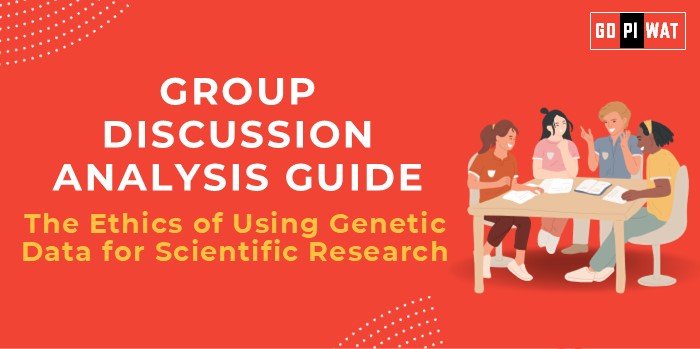📋 Group Discussion Analysis Guide: The Ethics of Using Genetic Data for Scientific Research
🌐 Introduction to The Ethics of Using Genetic Data for Scientific Research
Opening Context: Advances in genetics have revolutionized medicine and science, offering unprecedented opportunities to understand diseases and create personalized treatments. However, the use of genetic data poses ethical dilemmas around privacy, consent, and potential misuse.
Topic Background: The study of genetic information has been a cornerstone of modern science, with landmark achievements like the Human Genome Project. Recent breakthroughs in gene editing and genomics have intensified debates on balancing progress with ethical considerations.
📊 Quick Facts and Key Statistics
- 🌍 Global Genetic Data: Over 1,000 biobanks worldwide store genetic information, emphasizing its vast potential and risks.
- 💰 Genetic Testing Growth: The direct-to-consumer genetic testing market surpassed $2.4 billion in 2023.
- 📊 Research Funding: NIH allocated $2.2 billion to genomics research in 2023.
- ⚠️ Data Breaches: Approximately 70% of genetic data breaches involve misuse by third parties.
👥 Stakeholders and Their Roles
- 🏛️ Governments: Regulate ethical frameworks and data protection laws.
- 🔬 Scientists and Researchers: Utilize genetic data for innovation while maintaining ethical standards.
- 🏢 Private Companies: Develop genetic testing kits and analytics platforms, raising concerns about commercial motives.
- 🧬 Public and Patients: Provide data but demand transparency and protection of their genetic privacy.
🏆 Achievements and Challenges
✨ Achievements:
- 🩺 Disease Prevention: Genetic data has enabled early detection of diseases like BRCA-related cancers.
- 🎯 Precision Medicine: Tailored treatments have improved outcomes for cancer and rare diseases.
- 🌍 Scientific Collaboration: Initiatives like the 100,000 Genomes Project advance global understanding of genetics.
⚠️ Challenges:
- 🔒 Privacy Risks: Genetic data breaches can lead to discrimination in insurance and employment.
- 🤷 Informed Consent: Many participants lack full understanding of how their data will be used.
- 🌎 Global Inequities: Access to genetic advancements is uneven, favoring wealthier nations.
🌐 Global Comparisons:
- 🇮🇸 Success in Iceland: Genetic data from the entire population used for disease research with robust privacy safeguards.
- 🇺🇸 Challenges in the U.S.: Concerns over misuse by private firms like 23andMe.
💬 Structured Arguments for Discussion
- ✔️ Supporting Stance: “Genetic research can revolutionize healthcare by identifying disease predispositions early.”
- ❌ Opposing Stance: “The use of genetic data poses significant privacy risks and ethical challenges.”
- ⚖️ Balanced Perspective: “While genetic data enables groundbreaking research, safeguarding individuals’ rights is critical.”
🛠️ Effective Discussion Approaches
- 🎯 Opening Approaches:
- 📈 “Genomic advances have transformed healthcare but exposed gaps in ethical oversight.”
- 💵 “With over $2 billion invested in genomics, privacy concerns are more relevant than ever.”
- 🔄 Counter-Argument Handling: Acknowledge the role of genetic data in research while emphasizing stricter regulation.
🔍 Strategic Analysis of Strengths and Weaknesses
- 💪 Strengths: Breakthroughs in precision medicine; global collaboration in data sharing.
- ⚡ Weaknesses: Data security vulnerabilities; limited public awareness about consent.
- 🌟 Opportunities: Integration with AI for advanced analytics; international ethical frameworks.
- ⚔️ Threats: Commercial exploitation of genetic data; societal implications of genetic determinism.
📚 Connecting with B-School Applications
- 🌍 Real-World Applications: Discuss implications for healthcare management and pharmaceutical strategy.
- ❓ Sample Interview Questions:
- “How should companies balance profit motives with ethical obligations in genomics?”
- “Can genetic data drive equitable healthcare solutions globally?”
- 💡 Insights for B-School Students: Ethics in healthcare can inform leadership roles in CSR and policymaking.


